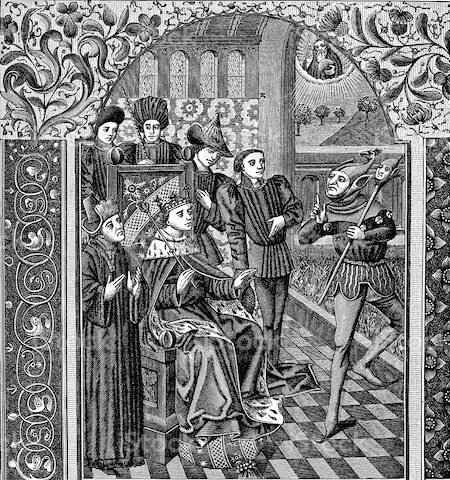The Significance of Jesters in Medievalism
King Richard’s Faire in Carver Massachusetts is a medieval-style experience filled with activities and elements related to this earlier period of knights, princesses, kings, and queens. The long-lasting impact and influence of this period is demonstrated through modern literature, plays, movies, and more, but I found the fair to be the most memorable of these portrayals. From a newcomer’s perspective, it was immediate fun to take in the ridiculousness of it all. Every individual performance was better than the last, so the initial hilarity of the comedy show was an amazing start to my experience. Yes, we are all likely aware of the existence of jesters during medieval times, but what makes them so important that this act was vital in performing at the fair? Why is it so key to the medievalism of the 21st century?
A medieval fool was basically a private comedian who not only told jokes, but also pulled stunts involving acrobats and juggling, a more flamboyant kind of comedy compared to what we see the standard to be today. Their purpose was to amuse their employer with these performances, and they were to be called upon whenever someone needed cheering up. Other than maybe a couple sticks in the mud, we all love to laugh. It is natural for humans to strive to be content, and laughing, being an outburst of happiness, is the purest and most intense form of this. Throughout history, we have seen the value of laughter as comedy persists even within literature of ancient times. Based on this fact, it should come as no surprise that these values continue into the traditions and practices of the Medieval ages.
On top of comedy, we as humans also admire honesty, and jesters had the advantage of providing this without constraint. This to me feels like a pertinent reason for the popularity of a jester’s consistency in the depiction of Medieval times in the 21st century. People today easily find certain comments of others to be offensive, thus they take to the internet to bring their complaints to the masses, sometimes demanding that others be irritated as well. With a jester though, humor comes from the revelation of a truth previously left timidly unaddressed by the audience. No one can be upset because this truthfulness is simply the nature of what a jester is, so who can stay mad? Seeing fellow audience members laughing helps for recognition of this safe space, thus everyone is more comfortable, creating a sort of unity among the audience. In this way a jester’s role allows people to feel free to laugh and joke without feeling the fear of an ingenuine comedian or controversial material.
Overall, this type of comedy is a token asset to the idea of medievalism as this role of jester contrasts that of often questionable and strictly conversational comedians. In my opinion, King Richard’s Faire had a perfect representation of this figure and allowed for the audience to enjoy their experience in a way that comedians of present day can no longer provide.






